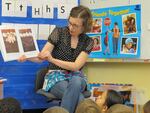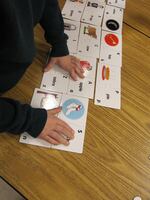Oregon aims to graduate 100 percent of public school students in the Class of 2025. That may sound like a long time from now. But kids in that Class of 2025 are almost halfway through kindergarten. And educators say early learning is a key measure of whether students will succeed later.
With that in mind, OPB is charting the progress of kindergarteners at Earl Boyles Elementary, in the David Douglas School District.
Rob Manning starts our Class of 2025 series with a visit to Earl Boyles.
Alia Woolfe teaches one of three kindergarten sections at Earl Boyles Elementary. She pulls out one of her favorite books to read aloud to her class -- 27 kids, when they’re all here.

Kindergarten teacher Alia Woolfe reads to her students.
Rob Manning / OPB
Alia Woolfe: “The title of the book is ‘Friends’. The author – remind me what the author does.”
Kids: “Write it!”
Alia Woolfe: “That’s right – the author writes.”
After reading the book, Woolfe splits the kids up by reading level.
Alia Woolfe: “I would like to get our reading centers ready.”
Kids: “Yay!”
Alia Woolfe: “I do want to give you a reminder, friends, that some of you will be at tables… by yourselves.”
Kids: (gasp!)
Alia Woolfe: “And your job when you’re working at your tables by yourself, is to work hard, have a quiet work voice, and be responsible for yourself.”
Getting kids to meet high standards, when budget cuts have forced class size to grow, is a big challenge facing Oregon leaders.
Governor John Kitzhaber hired Oregon’s first-ever Chief Education Officer, to tackle that problem.
It was at Earl Boyles Elementary where Kitzhaber announced his hire of former New York City schools’ chancellor Rudy Crew.
Back in May, Crew said being introduced at Earl Boyles was important to him.
“Because it really signals that this is about children – first, foremost, and forever. And I came largely because that vision and all the structure and all the apparatus and all the tension evenaround it - is exactly the right context in which we have to have this conversation – not just here in the state of Oregon, but fundamentally, across this entire nation,” Crew said.
Three-quarters of Earl Boyles students come from poverty. One-quarter speak languages other than English at home.
Earl Boyles isn’t just home to students considered “at risk.” It’s also a place where educators are trying new things to help them.
One new strategy is a preschool program launched this year at the school. Earl Boyles Principal Ericka Guynes watches the youngsters come in off the playground….
Guynes: “Oh, here they come, they’re like little ducklings coming in a row, they’re so sweet…”
But the preschool program won’t directly help the first kids expected to graduate at a 100-percent rate. That’s because that Class of 2025 was already in kindergarten, when the preschool launched this year.
Many of the kindergartners came to Earl Boyles with no preschool.
School leaders want to help the five and six year-olds at Earl Boyles through a new tracking system of student learning.
The Kindergarten Readiness Assessment pilot involves sixteen Oregon schools, including Earl Boyles.
A big goal for teachers like Alia Woolfe is to get kindergartners on track tobecome readers.
Woolfe moves from group-to-group, but as the only adult to monitor more than 20 kids, the groups are often on their own.
Four children at one table are fitting together matched puzzle pieces – one piece has a letter on it, another has a word starting with that letter.

Kindergarten students match letters and sounds with images (file photo).
Rob Manning / OPB
Logan Van Wormer and Charlotte Van Meter found matches.
Logan Van Wormer.: “We match letters – with Lion, because it starts with ‘L’.”
Rob: “Looks like you matched one. What did you find?”
Charlotte Van Meter: “Umm… a baby.”
Rob: “And what letter does that start with?
Charlotte: “Buh, buh, B.”
Learning letter sounds is fundamental for reading.
Some kids know how to find matching puzzle pieces – but connecting pieces with letters to sounds, and words – not so much.
Jacob Tomkins: “Yes! I made it!”
Rob: “Can you tell - what word did you match with the letter?”
Jacob: “String.”
Rob: “Can you tell what letter that is?”
Jacob: “Y.”
Rob: “Y?”
What Jacob Tomkins called “string,” was a picture of yarn.
Kindergarten teachers at Earl Boyles assessed how well kids knew their letter sounds at the beginning of the year.
About half of them were in the lowest category, or considered “at-risk.” So teachers made “letter sounds” a major focus.
After reading, Woolfe’s kindergartners bounce out the door for recess.
With one eye on the playground, teacher Alia Woolfe says her students are showing improvement.
“You know, there’s such different ability levels, and different learning styles, but I do feel like, they’re getting there.”
Earl Boyles assessed student progress in December.
There were fewer students in that lowest category for letter sounds – but it was still more than a quarter of kids.
Earl Boyles principal Guynes says the Kindergarten Readiness Assessment is helping focus instruction.
And Guynes says the detailed, student-level data is highlighting hidden issues – like how to get kids to come to school consistently.
Ericka Guynes: "Also, with attendance for kids that are chronic – which is below that 90 percent, what are we doing specifically?”
Rob: “And you’re already seeing kids who are on track for that, in kindergarten?”
Ericka Guynes: “Yeah.”
The first year of school for the Class of 2025 means learning to be students.
Ericka Guynes says that’s really hard to teach, especially since her kindergarteners have the worst attendance at the school.
And the youngsters who do make it to school often have a hard time with certainbehavior basics – like sitting still.
Alia Woolfe coaches and cajoles kids to pay attention, and gets kids who are sitting still to help their classmates.
When she can feel herself losing the battle, there’s always the “wiggle song.”
As these kindergartners continue their long journey to high school graduation in 2025, movement may be a recurring theme.
Educators have found that low-income families are more likely to relocate repeatedly during a child’s school career.
That can disrupt relationships students have with teachers and classmates – and set kids back, as they start over.
Oregon legislators have overhauled how public education is supervised, with new boards and commissions serving preschoolers through graduate school.
The state's Chief Education Officer, Rudy Crew, is in charge of implementing those changes, though he points out it's up to lawmakers and the governor to fund them.
Education advocates – including Rudy Crew – say that it’s going to take a more effective system, sufficient funding, and the help of a multitude of teachers, parents, and volunteers to help every kid in the Class of 2025 earn a high school diploma.
